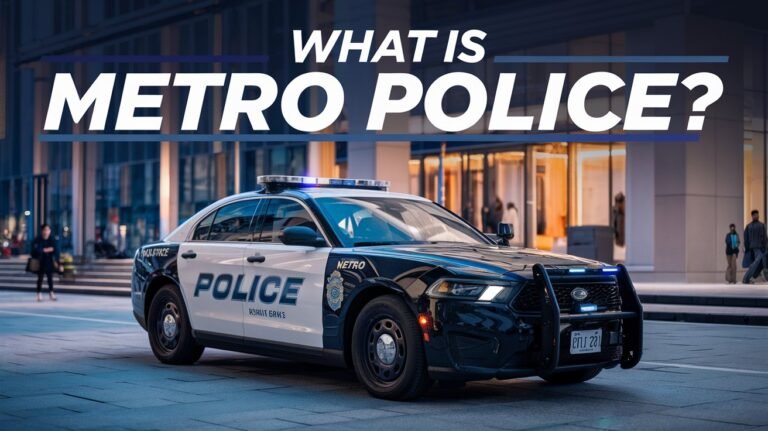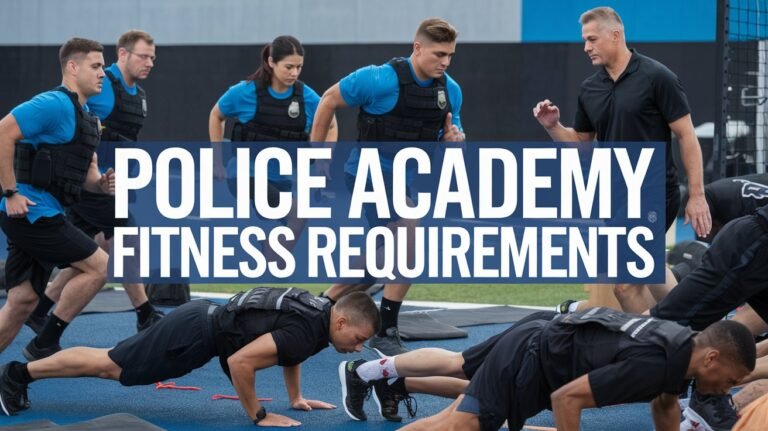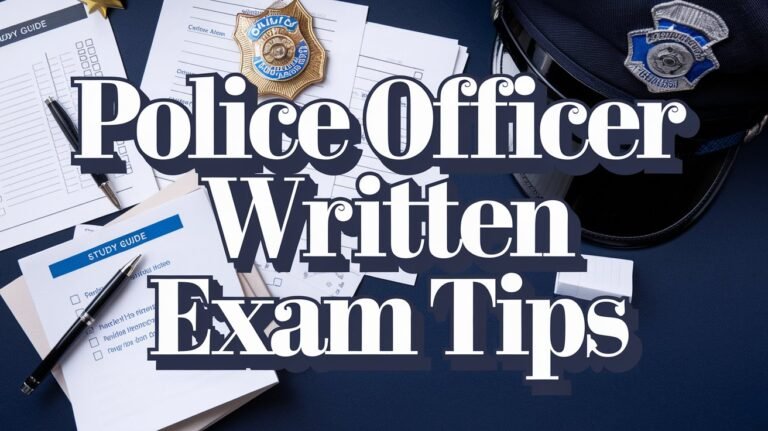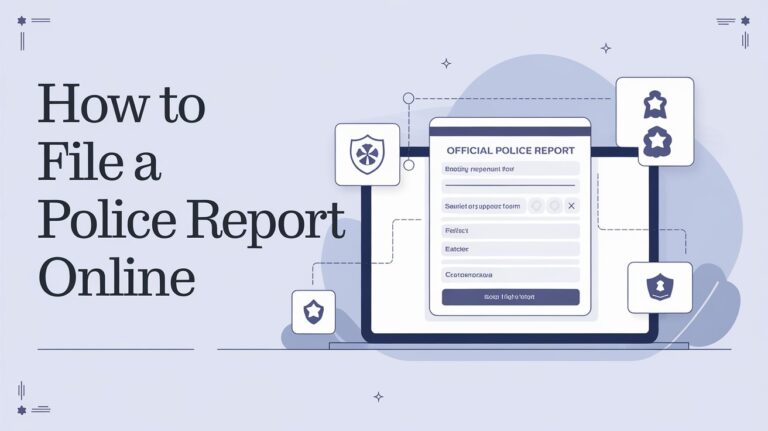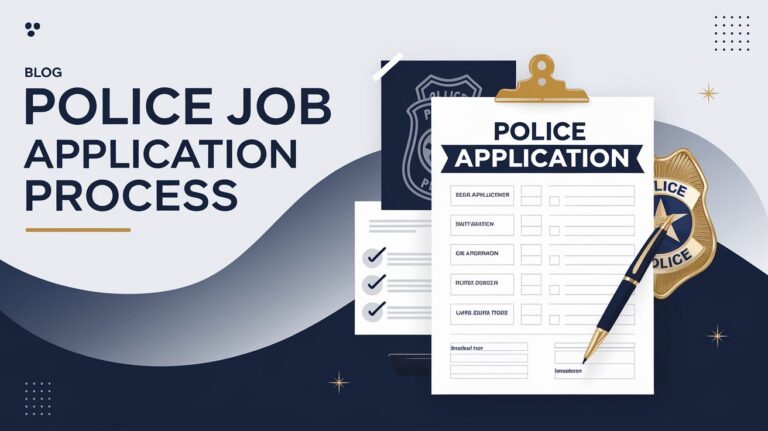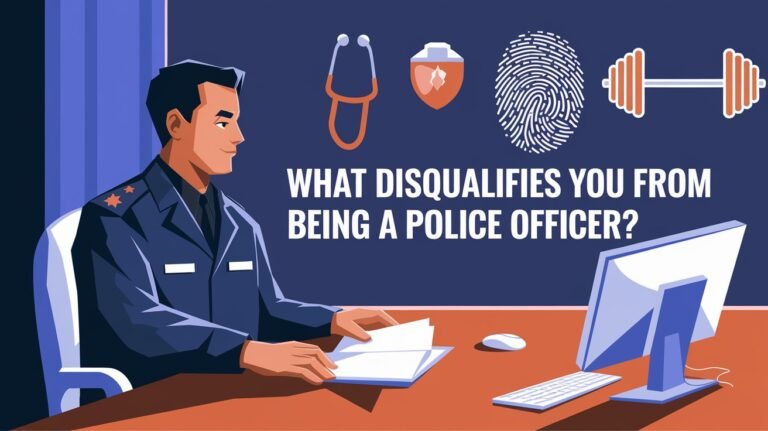Prepare for Police Interview: Essential Tips and Strategies?

Getting ready for a police interview is key to landing a job in law enforcement. Police use oral board interviews to check candidates for new roles, promotions, and transfers. It’s vital to prepare well to show you’re the right fit.
Start by making a brief opening statement. It should cover your professional wins and why you want to join the police department. Keep it focused and positive, showing your excitement and qualifications.
Being honest and thoughtful is important when talking about why you chose to be a police officer. Knowing a lot about the police agency you’re applying to also helps. It shows you’re really interested in the job and the department’s goals.
When talking about your weaknesses, offer ways to improve instead of vague answers. This shows you’re aware of your areas for growth and serious about getting better. In law enforcement, this is highly valued.
Police Interview Process Overview
Those who want to join law enforcement face a tough interview process. This is a key step to becoming an officer. The police oral board interview is used by many agencies to check if candidates are right for the job. A panel of experienced officers looks at the applicant’s background, reasons for joining, and problem-solving skills.
Types of Police Interview Panels
The panel usually has 3 to 5 members. They are often high-ranking officers, like the department head and human resources staff. These interviewers score candidates from 1 to 9. To pass, you need to score between 90 and 100 points.
Interview Room Setup
The interview is in a big room. There’s only one chair for the candidate, making them feel exposed. This setup tests how well the candidate handles the pressure.
Duration and Format Expectations
The interview lasts 30 to 50 minutes. The panel will ask 6 to 8 questions. They want to see how you solve problems and understand the job through scenarios. Be ready to talk a lot and possibly do role-playing.
| Interview Duration | Interview Panel Size | Scoring System | Successful Candidate Score | Hiring Chance Score Range |
|---|---|---|---|---|
| 30-50 minutes | 3-5 members | 1-9 points | 90-100 points | 80-89 points: Good chance 70-79 points: Lower chance |
Essential Background Research Before the Interview
Doing thorough research is key when getting ready for a police department interview. It’s important to learn about the city’s history, size, and population. Also, knowing about the police force’s size and roles is crucial.
Understanding the city charter is also vital. It explains the governing body’s powers and duties. This knowledge helps candidates show they’re ready and interested in the role.
Knowing the police department’s challenges and goals is also important. This lets candidates show how their skills match the department’s needs. It shows they could be a valuable addition to the team.
- Investigate the city’s demographics, including population size and key characteristics.
- Understand the police department’s workforce, such as the number of officers and their roles.
- Review the city charter to grasp the governing body’s structure and decision-making powers.
- Research the police department’s current initiatives, challenges, and future objectives.
| Statistic | Value |
|---|---|
| Promotions often separated by 1/100ths of a percentage point | 1/100% |
| Difference between being number one or number twelve on the list | 1 word or sentence |
| Candidates may receive commendations for crime reduction plan | Yes |
| Percentage of interview questions about situational scenarios | 63% |
| Percentage of interview content assessing conflict resolution skills | 42% |
By doing deep research on the police department and the city, candidates show they’re truly interested. They also show they understand and are ready for the interview. This approach can help them stand out and boost their chances of getting the job.
Prepare for Police Interview: Key Requirements
Starting your journey to become a police officer? It’s key to know what you need for the police interview. From your documents to how you look and how you feel, every detail matters. It’s all about making a good impression and showing you’re right for the job.
Professional Documentation
Make sure you have all your professional papers ready. This includes certifications, diplomas, and references. These prove your skills and experience, showing you’re serious about law enforcement.
Physical Appearance Guidelines
Your look during the interview is very important. Follow the department’s dress code to look neat and professional. This shows you respect the job and can follow rules.
Mental Preparation Techniques
- Practice answering common police interview preparation questions. This helps you show your knowledge and problem-solving skills.
- Learn to handle stress and stay calm during the suspect interrogation. This shows you’re ready for the job.
- Keep a positive and confident mindset. Focus on your strengths and what you can bring to the department. This will help you do well in the interview tips.
The police interview is your chance to show your passion for law enforcement. It’s your chance to prove you’re committed to public service and ready for the challenges of this career.
Common Police Interview Questions Analysis
Getting ready for a police interview is more than just memorizing answers. You need to think about questions that test your problem-solving, ethics, and fit with the department. Questions like “Why do you want to be a police officer?” and “What if you saw another officer doing something wrong?” are meant to check your character and dedication to justice.
Interviewers want to know how you handle tough situations. Your answers should be honest, thoughtful, and show you care about the department’s goals. You might be asked about dealing with tough bosses, arresting family, or facing unethical behavior among officers.
- Police officers need great communication skills to talk to the public, colleagues, and bosses.
- They must quickly analyze situations, make smart choices, and think about outcomes to keep people safe.
- Working together with other officers and experts is key in law enforcement for solving cases and operations.
By getting ready for different police interview questions, you show you can solve problems, make ethical choices, and share the department’s values. This way, you can stand out and have a better chance at a fulfilling career in law enforcement.
Effective Communication Skills for Police Candidates
Being good at talking is key for those wanting to be police officers. They need to talk clearly and well from the first interview to every day with the public. Knowing how to communicate well is a big plus.
Body Language Tips
How you act without words is very important in an interview. Looking people in the eye, standing tall, and smiling shows you’re confident and friendly. But, fidgeting or crossing your arms can make you seem nervous or not interested.
Voice Tone and Clarity
How you speak matters a lot too. Police need to talk clearly and with authority. They should speak loudly and clearly, without mumbling or using a weird voice.
Active Listening Techniques
Listening well is just as important as talking. Police need to really listen and show they care. This means looking at the person, nodding, and saying “yes” or “I understand.”
| Communication Skill | Importance for Police Candidates | Practical Application |
|---|---|---|
| Body Language | Conveys confidence and approachability | Maintain eye contact, stand upright, use open gestures |
| Voice Tone and Clarity | Delivers information in a professional, authoritative manner | Practice speaking with a strong, steady voice, avoid vocal fry or mumbling |
| Active Listening | Demonstrates engagement and understanding | Maintain eye contact, nod, provide verbal acknowledgments |
By getting better at these skills, police hopefuls can do well in interviews. They’ll also be ready for good communication in their police work.
Situational Judgment Scenarios
Candidates for law enforcement roles must show good judgment and ethical decision-making. They also need to handle complex situations well. The police situational judgment test is key in checking these skills.
These tests give candidates real-life policing scenarios. They might face situations like handling domestic disputes or dealing with corrupt colleagues. They must think carefully, balance their actions with community and ethical standards, and decide what to do next.
- Quick, rational decision-making is tested to see how candidates handle pressure. They need to pay close attention to the details in each scenario to make the best choices.
- Objective and logical thinking is stressed over emotional reactions. Officers are expected to make decisions based on their own judgment and experience, following established priorities and hierarchy.
- Common sense, police priorities, and hierarchy are the basics for finding the right response in these scenarios.
Successful candidates will show good judgment, follow protocols, and know how to calm down tense situations. By showing their ethical standards and decision-making abilities, they can handle the tough scenarios in the police situational judgment test.
Character Assessment Components
Becoming a police officer is not just about grades and fitness. Police departments also check a candidate’s character and mind. They look at integrity, stress handling, and leadership skills. These are key for the tough job of law enforcement.
Integrity Testing Methods
Integrity tests are key in assessing a candidate’s moral compass and decision-making. They might face ethical dilemmas or scenarios. This shows if they can handle complex situations with good judgment and morals.
Stress Response Evaluation
This part checks how a candidate handles stress. It’s like seeing how they act in high-pressure situations. They’re judged on staying calm, thinking clearly, and acting well under stress.
Leadership Potential Indicators
Police officers often lead in tough situations. The assessment looks at their leadership skills. They’re tested on teamwork, conflict resolution, and making decisions in a team setting.
Police departments aim to find the right people for the job. They look for strong morals, emotional stability, and leadership skills. These qualities ensure they can serve and protect their communities well.
Legal Knowledge Requirements
Those who want to be law enforcement officers need to know the basics of law. This includes police legal knowledge, criminal law understanding, and constitutional rights. This knowledge helps them deal with the criminal justice system and protect people’s rights.
In the police interview, candidates might face questions about recent legal changes or big cases. Interviewers check if the applicant keeps up with legal updates and can use legal rules in real situations.
- Knowing about Miranda rights, search and seizure laws, and use of force rules is key.
- Candidates should talk about their understanding of law enforcement’s legal duties and limits.
- Showing a deep understanding of how constitutional rights, criminal law, and police actions work together can make an applicant stand out.
| Evaluation Area | Description |
|---|---|
| Legal Knowledge | Candidates’ understanding of local, state, and federal laws, criminal justice procedures, and community-oriented policing practices. |
| Problem-Solving and Decision-Making | Applicants’ ability to apply legal principles and exercise sound judgment in complex, sensitive, and routine situations. |
| Commitment to Continuous Learning | Candidates’ demonstrated interest in staying up-to-date with legal developments and their willingness to expand their legal knowledge. |
“Demonstrating a commitment to ongoing legal education can be beneficial for aspiring law enforcement officers during the interview process.”
Department-Specific Protocol Understanding
When getting ready for a police department interview, knowing the agency’s specific rules is key. You should learn about the chain of command, how to report incidents, and any community programs they run. Showing you know the department’s mission, values, and special units shows you’re serious and well-prepared.
Looking into the department’s recent challenges and new programs can help you explain how you fit in. This shows you’ve done your homework and want to help them succeed.
Understanding the department’s rules and procedures shows you’re committed to their standards. This can make you stand out in a crowded field. It shows you’re ready to fit right in and do your part.
FAQ
Why are police interviews crucial for evaluating new hires, transfers, and promotions?
Police interviews help show if a candidate is right for the job. They let candidates show their skills and fit with the department’s goals.
What should candidates include in their opening statement for a police interview?
In the opening statement, candidates should talk about their career strengths. They should explain why they want to join the department. It’s important to stay positive and avoid negative details.
What is the typical format of a police oral board interview?
Oral board interviews are common. They involve a panel of senior officers asking questions in a large room. Candidates face tough questions and might do role-playing, making the setting feel exposed.
What kind of background research should candidates do before a police interview?
Candidates should learn about the city’s history and the police department. Knowing the department’s challenges and goals shows they’re interested and prepared.
What documentation and physical appearance should candidates have for a police interview?
Candidates should bring professional documents and dress neatly. They should also prepare mentally by practicing answers and managing stress. Being confident is key.
What are some common questions asked in police interviews?
Questions might include why you want to be a police officer. Or what you’d do if you saw an officer breaking the law. Answer honestly and show you share the department’s values.
What communication skills are important for police candidates?
Good communication is vital. This includes using body language and speaking clearly. Listening well is also important, like keeping eye contact and nodding.
What types of situational judgment scenarios are used in police interviews?
Scenarios might involve handling disputes or dealing with misconduct. Candidates should show good judgment and follow protocols. They should also know how to calm situations.
What character assessments are conducted during police interviews?
Assessments look at integrity, how you handle stress, and leadership skills. They might use scenarios or questions about teamwork and conflict resolution. Show strong morals and emotional control.
What legal knowledge is required for police interviews?
Candidates need to know basic laws and rights. They should understand Miranda rights and laws on search and seizure. Showing a commitment to learning more about the law is good.
How can candidates demonstrate their understanding of department-specific protocols?
Research the department’s mission, values, and procedures. Knowing about challenges and recent efforts shows you’re interested and prepared.

